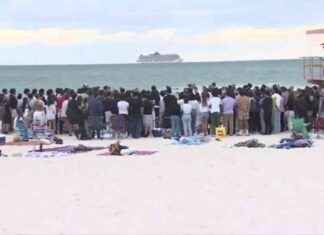Xavier Trias and Ernest Maragall, and the negotiating teams of Junts and ERC, practically closed the pact last night for the two pro-independence groups to govern Barcelona starting this afternoon. This very morning, the militants of both parties, in what is expected to be a formality, will ratify the agreement that the candidates have been working on since the day after the elections, an alliance that, except for a major surprise at the last minute, will allow Trias to recover the mayoralty that Ada Colau took from him eight years ago, and Ernest Maragall, in his day one of the strong men of the socialist governments of the city, to become number two in the City Council upon assuming the first tenure. Only a twist in the script in the maneuver that the PSC continued trying yesterday to count on the votes of BComú and PP, an operation that last night was still bogged down, would prevent the expected outcome.
The principle of agreement has been cooking these last three weeks at such a slow fire that last night not even those in charge of putting black on white the negotiation dared to consider it completely closed. One of the most complicated issues to resolve was the first distribution of the government organization chart, which in principle reserved four mayoral tenures for Junts and two for ERC. Those of the formation led by Xavier Trias will be assumed by Neus Munté, Jordi Martí, Damià Calvet and Victòria Alsina, while the Republicans will be occupied by Ernest Maragall and Elisenda Alamany.
The negotiating teams finalized a first programmatic agreement yesterday – the extensive document of the government pact could be delayed for a few weeks, and the final folder with the distribution of positions and powers will not be ready until the July plenary session – and that outline of the organizational chart that will appear in the first decrees that Trias will sign today if his opponents do not add that minimum of 21 votes that would prevent him from being mayor again.
The areas entrusted to ERC will somehow have the presence of Junts councilors. The republicans could assume part of the social portfolios. According to various sources, Trias will apply logic in the distribution of functions, so that, for example, the former Minister of Territories, Damià Calvet, will have responsibilities in urban planning and infrastructures; Neus Munté, in social policies; and the former ministers Victòria Alsina and Ramon Tremosa, on issues related to the institutional representation and finances of the City Council. One of Trias’ most trusted people, Jordi Martí Galbis, would be called upon to play a relevant role in the Security area, recalling the role played by Joaquim Forn in the CiU government stage.
Trias and Maragall held another meeting yesterday at the City Hall to define the penultimate fringes of the proposal that their respective formations will submit today for the ratification of the bases in a process that will take place a few hours after the start of the plenary session. ERC has convened a national congress at 10:30 a.m. to discuss and give the final go-ahead. The formula chosen by Junts is another: a telematic vote of the militants open from 8 in the morning until 2 in the afternoon and with this question: “Do you trust Trias to negotiate and reach an agreement to reach a government of change? , progress and well-being in the city of Barcelona with Ernest Maragall and ERC?” .
While Junts and ERC were negotiating the investiture agreement, the popular Daniel Sirera, a key player in the success or failure of any alternative, responded to the courtship of the PSC, once again assuring that he will only vote for Collboni’s investiture if he commits in writing to not incorporate Ada Colau or any BComú mayor into the government. A condition that, added to the position up to now also immovable of the commons -they refuse to participate in a pact in which the PP intervenes-, makes the alternative to Trias impractical, although until the start of the plenary session it is very likely that rush the attempts.








